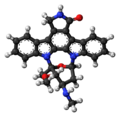Staurosporine
Staurosporine is a potent inhibitor of protein kinases, which are enzymes that modify other proteins by chemically adding phosphate groups to them. Discovered in the 1970s from the bacterium Streptomyces staurosporeus, staurosporine has been extensively studied for its potential therapeutic applications, particularly in the field of oncology.
History
Staurosporine was first isolated in 1977 from the bacterium Streptomyces staurosporeus. The compound was named after the bacterium from which it was derived. Since its discovery, staurosporine has been the subject of extensive research due to its potent protein kinase inhibitory activity.
Biochemical Activity
Staurosporine is a potent, non-selective inhibitor of protein kinases. It inhibits these enzymes by binding to their ATP-binding sites, thereby preventing them from phosphorylating their substrate proteins. This broad-spectrum activity has made staurosporine a valuable tool in biochemical research for studying the roles of various protein kinases.
Therapeutic Potential
Due to its ability to inhibit a wide range of protein kinases, staurosporine has been studied for its potential therapeutic applications. Most notably, it has been investigated as a potential treatment for cancer, as many types of cancer are driven by the abnormal activity of protein kinases. However, the non-selective nature of staurosporine's inhibitory activity has also raised concerns about potential side effects, as protein kinases play crucial roles in many normal cellular processes.
See Also
References
This article is a biochemistry stub. You can help WikiMD by expanding it!
Transform your life with W8MD's budget GLP-1 injections from $125.
W8MD offers a medical weight loss program to lose weight in Philadelphia. Our physician-supervised medical weight loss provides:
- Most insurances accepted or discounted self-pay rates. We will obtain insurance prior authorizations if needed.
- Generic GLP1 weight loss injections from $125 for the starting dose.
- Also offer prescription weight loss medications including Phentermine, Qsymia, Diethylpropion, Contrave etc.
NYC weight loss doctor appointments
Start your NYC weight loss journey today at our NYC medical weight loss and Philadelphia medical weight loss clinics.
- Call 718-946-5500 to lose weight in NYC or for medical weight loss in Philadelphia 215-676-2334.
- Tags:NYC medical weight loss, Philadelphia lose weight Zepbound NYC, Budget GLP1 weight loss injections, Wegovy Philadelphia, Wegovy NYC, Philadelphia medical weight loss, Brookly weight loss and Wegovy NYC
|
WikiMD's Wellness Encyclopedia |
| Let Food Be Thy Medicine Medicine Thy Food - Hippocrates |
Medical Disclaimer: WikiMD is not a substitute for professional medical advice. The information on WikiMD is provided as an information resource only, may be incorrect, outdated or misleading, and is not to be used or relied on for any diagnostic or treatment purposes. Please consult your health care provider before making any healthcare decisions or for guidance about a specific medical condition. WikiMD expressly disclaims responsibility, and shall have no liability, for any damages, loss, injury, or liability whatsoever suffered as a result of your reliance on the information contained in this site. By visiting this site you agree to the foregoing terms and conditions, which may from time to time be changed or supplemented by WikiMD. If you do not agree to the foregoing terms and conditions, you should not enter or use this site. See full disclaimer.
Credits:Most images are courtesy of Wikimedia commons, and templates, categories Wikipedia, licensed under CC BY SA or similar.
Translate this page: - East Asian
中文,
日本,
한국어,
South Asian
हिन्दी,
தமிழ்,
తెలుగు,
Urdu,
ಕನ್ನಡ,
Southeast Asian
Indonesian,
Vietnamese,
Thai,
မြန်မာဘာသာ,
বাংলা
European
español,
Deutsch,
français,
Greek,
português do Brasil,
polski,
română,
русский,
Nederlands,
norsk,
svenska,
suomi,
Italian
Middle Eastern & African
عربى,
Turkish,
Persian,
Hebrew,
Afrikaans,
isiZulu,
Kiswahili,
Other
Bulgarian,
Hungarian,
Czech,
Swedish,
മലയാളം,
मराठी,
ਪੰਜਾਬੀ,
ગુજરાતી,
Portuguese,
Ukrainian
Contributors: Prab R. Tumpati, MD





